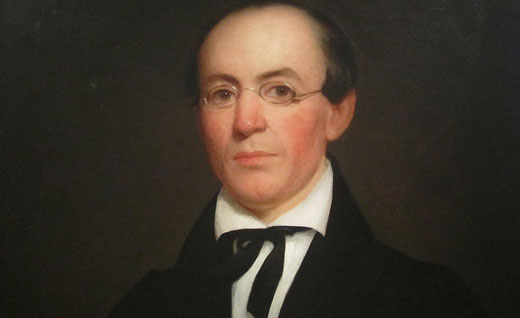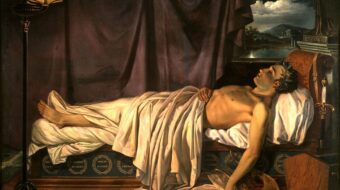
William Lloyd Garrison, one of the nation’s most outstanding abolitionist leaders, was born Dec. 12, 1805, in Newburyport, Mass.
From humble beginnings as the son of immigrants from the British colony of New Brunswick, in present-day Canada, Garrison became a printer, and used the power of the press to advocate and organize for abolition of slavery. In 1831 he founded and edited The Liberator, an anti-slavery newspaper. Its motto was “Our country is the world – our countrymen are mankind.”
In The Liberator’s first edition, Jan. 1, 1831, Garrison famously declared:
“I will be as harsh as truth, and as uncompromising as justice. On this subject, I do not wish to think, or to speak, or write, with moderation. No! No! Tell a man whose house is on fire to give a moderate alarm; tell him to moderately rescue his wife from the hands of the ravisher; tell the mother to gradually extricate her babe from the fire into which it has fallen; – but urge me not to use moderation in a cause like the present. I am in earnest – I will not equivocate – I will not excuse – I will not retreat a single inch – AND I WILL BE HEARD.”
And he was heard. The Liberator that gained an enormous circulation across the country, and was read by prominent political figures.
By 1832 Garrison had gained a wide following that enabled him to found the New England Anti-Slavery Society, which became a national center for the abolitionist movement. The following year Garrison and other leading abolitionists from 10 states founded the American Anti-Slavery Society. By 1838, the AAS had 1,350 local chapters with around 250,000 members.
Garrison and other abolitionist leaders such as Frederick Douglass and Wendell Phillips often debated and disagreed on the difficult tactics of the anti-slavery struggle, yet they were comrades in the movement.
Garrison championed women’s rights at a time when some felt that cause had to wait for later. He supported women’s rights advocates Angelina and Sarah Grimke and Lucy Stone. In 1840, when the World Anti-Slavery Convention meeting in London refused to seat America’s women delegates, Garrison refused to take his seat as a delegate, and joined the women in the spectator’s gallery.
Garrison died on May 24, 1879. Wendell Phillips and Frederick Douglass were among those giving eulogies at public memorial services for Garrison. Douglass said, “It was the glory of this man that he could stand alone with the truth, and calmly await the result.”
An excellent biography, All on Fire: William Lloyd Garrison and the Abolition of Slavery, by Henry Mayer, gives a vivid account of the man, the movement and the controversies, highly relevant for today. Highly recommended reading.
Photo: Portrait of William Lloyd Garrison by Nathaniel Jocelyn, oil on panel, 1833, National Portrait Gallery, Washington, D.C. Wikimedia Commons












Comments